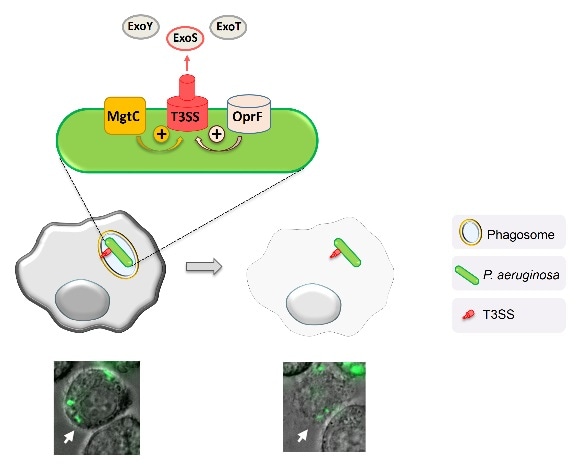A bacterial pathogen that typically multiplies outside of host cells can enter and induce the destruction of cells called macrophages, according to a study published June 20 in the open-access journal PLOS Pathogens by Anne-Béatrice Blanc-Potard of the Université de Montpellier in France, and colleagues.

Model for intramacrophage fate of P. aeruginosa. Phagocytosed P. aeruginosa PAO1 first resides in a vacuole, before escaping the phagosome and promoting macrophage lysis. Live imaging of macrophages infected with fluorescent P. aeruginosa allows to follow the lysis of a specific macrophage (white arrow on the picture). MgtC and OprF act positively on the expression of T3SS, which is involved in cell lysis driven by intracellular P. aeruginosa through the ExoS protein. Credit: Anne Blanc-Potard
Pathogenic bacteria are commonly classified as intracellular or extracellular pathogens. Intracellular bacterial pathogens can replicate within host cells, including macrophages, which ingest and kill microorganisms in a process called phagocytosis. By contrast, extracellular pathogens such as Pseudomonas aeruginosa multiply outside of cells. However, recent data have shown that several extracellular pathogens can enter host cells. For example, P. aeruginosa has been reported to be engulfed by macrophages in animal models.
In the new study, Blanc-Potard and her colleagues visualized the fate of P. aeruginosa within macrophages. P. aeruginosa first resided in vesicles called phagosomes and subsequently could be detected in the cytoplasm, indicating that the pathogen had escaped degradation within the phagosomes. The intracellular bacteria could eventually induce cell lysis – the disintegration of a cell through membrane rupture. Two bacterial molecules, MgtC and OprF, recently identified to be important for the survival of P. aeruginosa in macrophages, were found to activate intracellular production of type III secretion system (T3SS), which in turn was found to be involved in bacterial escape from the phagosome as well as in cell lysis caused by the bacteria. According to the authors, the transient stage in which P. aeruginosa resides inside of macrophages could contribute to bacterial dissemination during infection.
The authors add:
While the role of macrophages is to ingest and kill microorganisms, the pathogenic bacterium Pseudomonas aeruginosa can induce cell lysis when it insides inside macrophages. The weapons used by internalized bacteria to lyse the macrophage are decrypted.”
Source:
Journal reference:
Garai, P. et al. (2019) Killing from the inside: Intracellular role of T3SS in the fate of Pseudomonas aeruginosa within macrophages revealed by mgtC and oprF mutants. PLOS Pathogens. doi.org/10.1371/journal.ppat.1007812